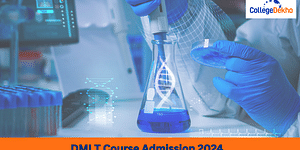BSc Dialysis Therapy
About B.Sc Dialysis Therapy
Indian medical educational institutions offer a host of paramedical courses which include a B.Sc in Dialysis Therapy. The course has been designed to train and produce graduates who are capable of understanding and assisting specialists in the different treatment processes. The students are trained to use various machines for dialysis help in the treatment of patients.
In many colleges, the course is also known as B.Sc in Dialysis Technology and is focused on training the students to assist in dialysis treatments of the patients. B.Sc Dialysis Therapy is a three-year undergraduate programme, where each student will learn the different medical concepts of the kidney, principles of dialysis, dialysis systems and machines, blood chemistries, etc.
As part of the course, students are also expected to intern for a year in the field of dialysis as well. As per the curriculum followed by institutions in India, all graduates are required to gain one-year experience through an internship. The curriculum also includes training in subjects such as Human Anatomy, Renal Diseases, Renal Transplantation, etc, to provide an all-round training in the field.
B.Sc Dialysis Therapy Highlights
Check out the highlights of B.Sc Dialysis Therapy here.
Level |
Undergraduate |
|---|---|
|
Duration |
3 years + 1 Year Internship |
|
Course Fees |
INR 20,000- INR 200,000 (Annual) |
|
Average Initial Salary |
2,50,000 - 7,00,000 LPA |
|
Exam Type |
Semesters |
|
Minimum Qualification Required |
10+2 |
|
Minimum Aggregate Score Requirement |
50% |
|
Selection Process |
Merit or Entrance Based |
|
Exams Accepted |
University-Level Entrance Exams |
|
Employment Sectors |
Govt and Pvt Hospitals, Clinics, Labs, etc. |
Dialysis Technology- What it is About?
Our kidney performs a very crucial role in blood purification. The patients who suffer from kidney failure are treated with an artificial methodology of blood purification. Dialysis is all about the removal of unwanted waste from the human body. These patients require dialysis for some time until the damaged kidney is cured or replaced. The equipment which is used to operate this mechanism is a hemodialysis machine. And the technologists involved in this basically monitor the equipment and the process involved in it. To operate the dialysis process, trained professionals are required who have adequate knowledge and skill in handling the entire process.
Table of Contents
B.Sc Dialysis Therapy Eligibility Criteria
- Candidates should have cleared their class 12 board examination in the stream of science from a recognised board of education.
- They must have secured 45%-50% aggregate score in the qualifying examination in subjects such as Physics, Chemistry and Biology or Mathematics.
- Some colleges/universities will offer admissions on the basis of the scores obtained in an entrance test, therefore, candidates will be required to sit for the specified exam, outlined by the college of choice.
B.Sc Dialysis Therapy Skills Required
The curriculum of B.Sc in Dialysis Therapy involves both academic teaching and practical training. Therefore, B.Sc Dialysis Therapy requires the candidates to have skills in the following domains:
- Interest in modern research techniques
- Interpretation Skills
- Effective Communication Skills
- Eager to make Scientific inquiry
- Thinking abilities
- Analyzing abilities
- Good observation skills
All the skills mentioned here will get empowered by the learning of the B.Sc Dialysis therapy courses.
B.Sc Dialysis Therapy Admission Process
Admissions to the 3-year bachelor’s course in India can be done in two different methods. Being a technical course, most colleges may conduct an entrance test at the university-level, to offer admissions to the aspirants. The second method involves direct admission to the course. These choices may differ from college to college, therefore, prior to applying to a college, aspirants are advised to check out the eligibility criteria specified by the college in question.
In Direct Admissions to B.Sc in Dialysis Therapy, candidates will be required to apply to the college of their choice, enter their qualification details and wait for college to release the merit lists. Based on the information provided and documents presented, candidates will be offered admissions.
In Entrance-based admissions, candidates will be required to apply to the competent authority that will conduct the entrance exam, sit and clear the exam and wait for the results. Once the results have been released, merit or cut-off lists will be prepared, on the basis of which, applicants will be offered admissions.
B.Sc Dialysis Therapy Entrance Exams
Though most colleges offer admission by evaluating candidates’ merit on the previous qualifying exam, some colleges consider the entrance exams for B.Sc Dialysis Therapy admission. Listed below are some of the entrance exams applicable for B.Sc Dialysis Therapy courses:
- Himachal Pradesh B.Sc Nursing Entrance Test
- Chattisgarh B.Sc Nursing Entrance Exam
- Maharshi Dayanand University Common Entrance Exam
B.Sc Dialysis Therapy Top Colleges
There are several B.Sc Dialysis colleges in India that offer B.Sc Dialysis Therapy courses. Check out the names of the B.Sc Dialysis Therapy Top Colleges:
|
Name of the Colleges |
Average Fees |
|---|---|
|
Manipal University |
Rs. 35,850/- |
|
Mahatma Gandhi Mission Institute of Health Sciences |
Rs. 2,87,000/- |
|
Jamia Humdard University |
Rs. 2,21,000/- |
|
JSS University |
Rs.33,625/- |
|
Sharda University |
Rs.1,26,000/- |
|
Jawaharlal Nehru University |
Rs.21,840/- |
B.Sc Dialysis Therapy Distance Education
B.Sc Dialysis course is not offered through Distance Education in India. Although Indira Gandhi Open National University has a distance course on Dialysis which is a post-doctoral certificate course and not applicable for the B.Sc Dialysis Therapy graduates.
B.Sc Dialysis Therapy Syllabus
First Year:
Basic Human Anatomy |
Principles of Dialysis |
|---|---|
|
Physiology and Anatomy of Human Kidney |
History and Types of Dialysis |
|
Vascular Access for Dialysis |
Haemodialysis Machine |
|
Renal Diseases |
Anticoagulation |
Second Year:
Sterile Techniques of Dialysis |
Concepts of Dialysis and Nutrition |
|---|---|
|
Dialysis Technology with Pharmacology |
Applied Anatomy of Dialysis Therapy |
|
Applied Physiology of Dialysis Therapy |
Medical Terminologies |
|
Complications in Dialysis |
Management of Complications |
Third Year:
Microbiology and Pathology |
Safety and Sanitation |
|---|---|
|
Applied Microbiology of Dialysis Therapy |
Applied Pathology of Dialysis Therapy |
|
Dialysis Equipment and System |
Final Projects |
B.Sc Dialysis Therapy Course Comparison
A comparison between B.Sc in Dialysis Therapy and B.Sc in Physiology is elaborated in the table below:
|
Parameters |
B.Sc Dialysis Therapy |
B.Sc Physiology |
|---|---|---|
|
Course Name |
Bachelor of Science in Dialysis Therapy |
Bachelor of Science in Physiology |
|
Course Description |
B.Sc in Dialysis Therapy or B.Sc in Dialysis Technology focuses on the study of dialysis. Throughout the course, candidates are taught about the artificial procedure of blood purification. |
B.Sc Physiology is all about the study of biological function. |
|
Duration |
3 Years |
3 Years |
|
Eligibility |
Must be qualified in (10+2) in Science |
Must be qualified in (10+2) in Science |
|
Average Course Fee |
INR 20,000-INR 300,000 |
INR 10,000-100,000 |
|
Admission Type |
Direct/Entrance Based |
Merit/Entrance Based |
|
Job Roles |
Dialysis Technician, Medical Assistant, Medical Technician, Dialysis Assistant, etc. |
Sports Physiologists, Research Physiologists, Physiotherapists, etc. |
|
Average Salary |
INR 2Lakhs -4 Lakhs |
INR 2 Lakhs- INR 4 Lakhs |
B.Sc Dialysis Therapy Career Options and Job Prospects
Like different paramedical and medical courses, students have a brilliant opportunity to enter the medical industry. Skilled and qualified Dialysis Technicians are in dearth in the industry, which can be solved through graduating from the course. Being a paramedical course, graduates will be able to pursue a career path in any healthcare institution or a hospital.
The initial salary of a B.Sc Dialysis Therapy graduate can range anywhere between ?2,00,000 and ?6,00,000. Here is a list of job profiles and areas of employment, which can be chosen by a prospective B.Sc Dialysis Therapy graduate.
Check out the Job Profiles Available for B.Sc Dialysis Therapy graduate:
-
Dialysis Technician
-
Dialysis Therapist
-
Dialysis Assistant
-
Medical Assistant
-
Medical Laboratory Assistant
-
Medical Technician
Some of the employment areas available to the graduates are as follows:
-
Government and Private Hospitals
-
Clinics
-
Dialysis Clinics
-
Medical Laboratories
Another option viable for graduates of the course is to pursue higher education in the field. Aspirants will be able to pursue postgraduate courses in relevant paramedical fields or take up a management course as well.
B.Sc Dialysis Therapy Future Scopes
B.Sc Dialysis or B.Sc Dialysis Technology offers plenty of career opportunities for the candidates holding this degree. The B.Sc Dialysis candidates are mostly recruited in the dialysis units of hospitals, nursing homes, etc. The surge of ESRD or End Stage Renal Diseases has created a new demand for dialysis professionals. In this respect, the job scopes in this field are high.
Again, after the launch of the Pradhan Mantri National Dialysis programme in 2016, new hospitals have been founded across the nation resulting in more job scopes for dialysis professionals. Therefore, having a degree in B.Sc Dialysis will ensure that aspiring professionals will be easily hired by recruiters.
After completing the B.Sc in Dialysis Therapy, one can get enrolled in private clinics, educational institutions, govt. and private hospitals etc. If the candidates plan to go for higher studies after pursuing this course, degrees like MSc, PhD, MPhil are open for them. All over the world, there is a good demand for dialysis professionals. Only after pursuing the course, candidates will be able to meet the needs of the patients.
B.Sc Dialysis Therapy Job Roles
There are many B.Sc Dialysis graduates who complete the B.Sc in Dialysis course and get the most desired jobs every year. There are numerous B.Sc Dialysis jobs available in India. Some of the jobs and their key responsibilities are described below:
Dialysis Technician- The duties and responsibilities of a Dialysis Technician include collecting patients’ vitals, setting up and managing dialysis machines, monitoring technical vitals at the time of treatment, etc. These professionals work in collaboration with the doctor and nurse
Dialysis Assistant- The Dialysis Assistant works collaboratively with the Dialysis Assistant and helps the patients with treatment and also takes care of them after the dialysis. Operating dialysis machines are also a part of their job.
Medical Assistant- The key role of a Medical Assistant is to prepare the patients for the examinations, assist the doctors/physicians at the time of examinations, collect samples for the lab tests, etc.
Medical Laboratory Assistant- A Medical Laboratory Assistant assists the scientists and researchers in their research works. Their responsibilities include sample processing, recording findings, etc.
Medical Technician- An array of jobs is performed by the Medical Technicians. Their jobs include drawing blood, analyzing test results, studying blood samples, applying dressings, etc.
B.Sc Dialysis Therapy Salary
The average salary for B.Sc Dialysis Therapy ranges from INR 3 Lakhs to INR 7 Lakhs. However, a B.Sc Dialysis salary varies according to the job profiles and work experiences. Listed below are the salaries of B.Sc Dialysis professionals:
|
Job Profiles |
Annual Average Salary |
|---|---|
|
Dialysis Technician |
INR 2.5- 4.5 Lakhs |
|
Dialysis Assistant |
INR 3 -7 Lakhs |
|
Medical Assistant |
INR 2.3-5 Lakhs |
|
Medical Laboratory Assistant |
INR 2-4Lakhs |
|
Medical Technician |
INR 2.5-5 Lakhs |
FAQs about B.Sc DT
What are the top colleges offering B.Sc Dialysis Therapy courses ?
I want admission in B.Sc Dialysis Therapy. Do I have to clear any exams for that ?
What is the average fee for the course B.Sc Dialysis Therapy ?
What are the popular specializations related to B.Sc Dialysis Therapy ?
What is the duration of the course B.Sc Dialysis Therapy ?
Related Questions
Popular Courses
- Courses
- B.Sc Dialysis Therapy














